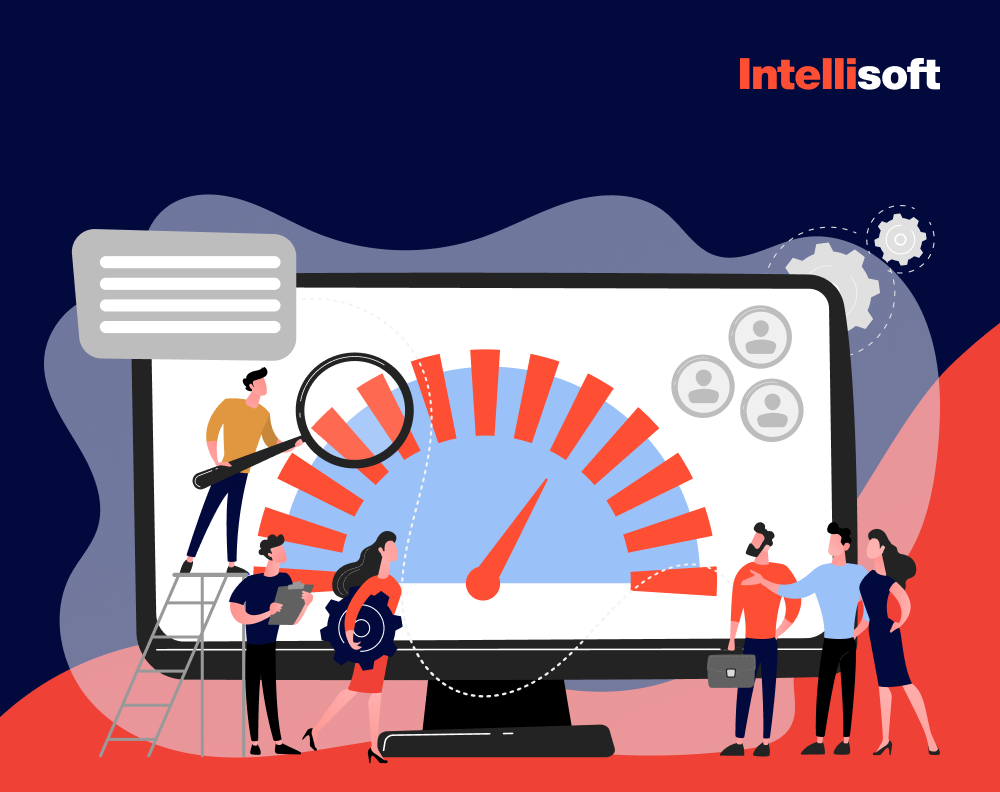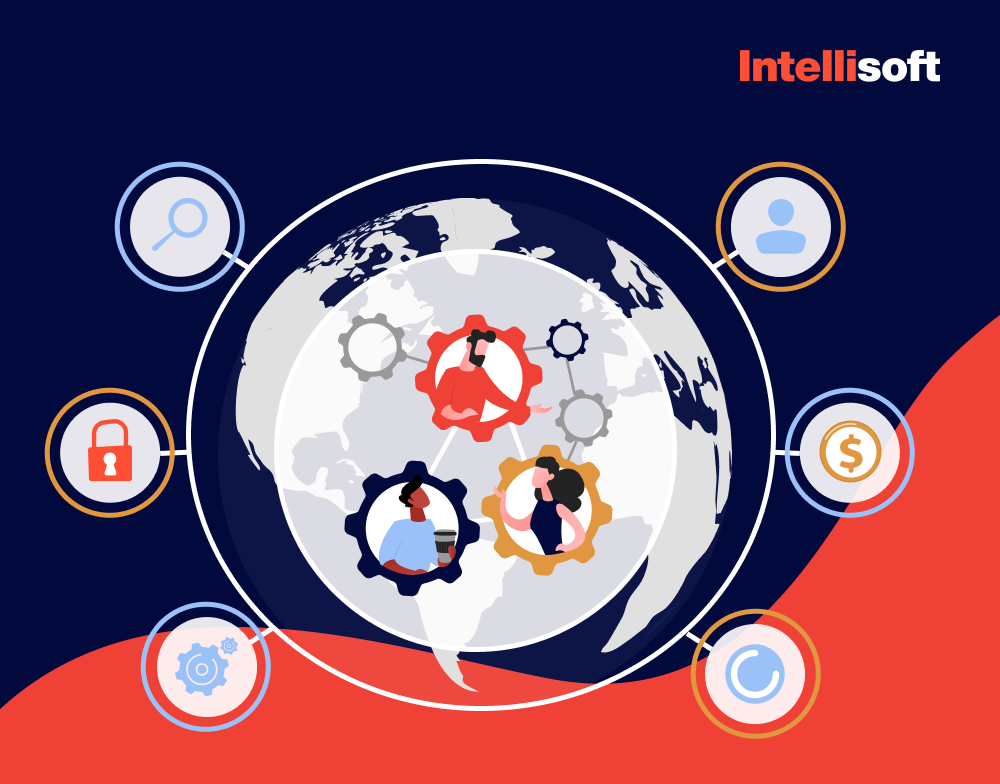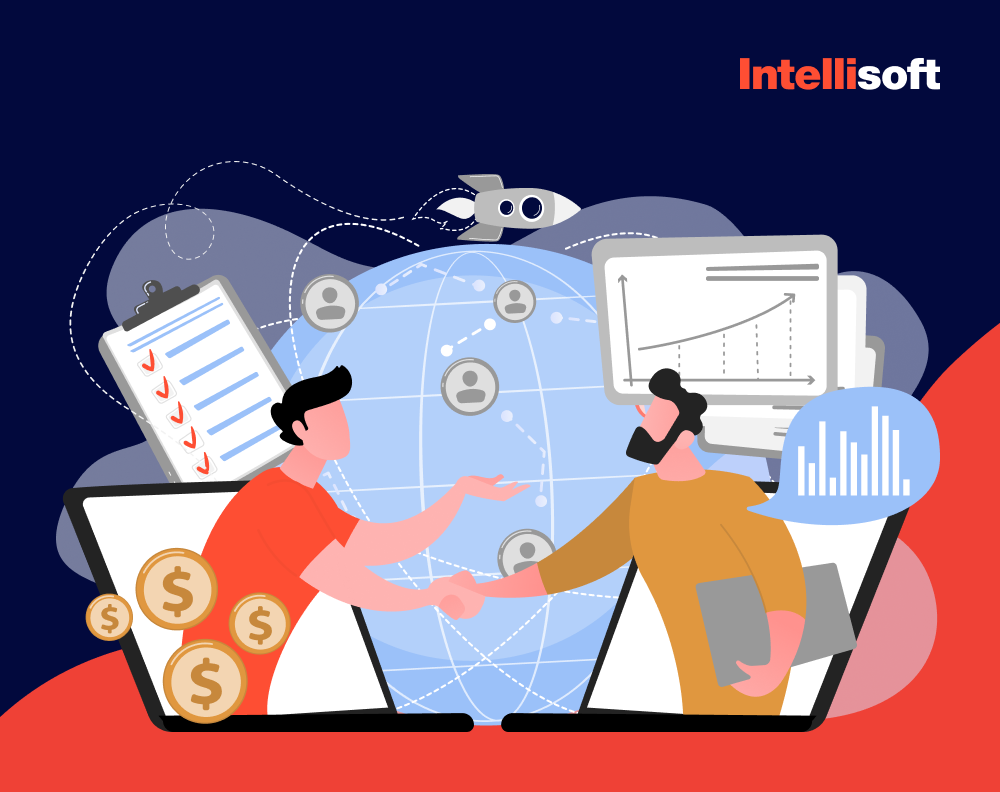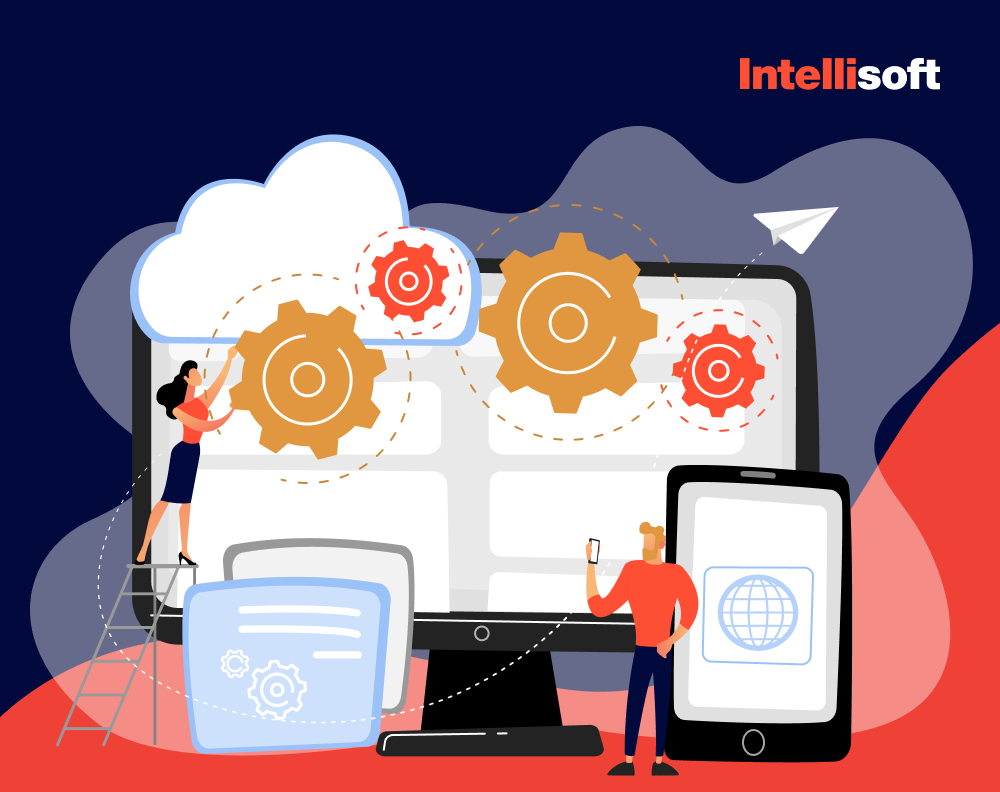Databases play a pivotal role in the business world, often without getting the recognition they deserve. The capacity to store, manage, and analyze vast amounts of information is not just beneficial—it’s essential. This reliance on data-driven decisions has brought data bases into the limelight, making their development crucial for modern organizational success.
Consequently, the need for a skilled database developer is on the rise. The United States Bureau of Labor Statistics projects a 9% increase in jobs for administrators and architects from 2021 to 2031, outpacing the average growth for all occupations. This growth highlights the indispensable role data base developers play in today’s data-focused environment.
So, what does a database developer actually do, and why are they so in demand? This article will explore their responsibilities, the vital role they play in businesses, and the promising earnings they can expect.
As Tim Berners-Lee said: “Data is a precious thing and will last longer than the systems themselves.”
Table of Contents
What Does a Database Developer Do?
Database developers are often the unsung heroes working behind the scenes, meticulously crafting the essential data bases that underpin an organization’s data infrastructure. With their expertise in writing and refining SQL queries, these tech specialists ensure that data retrieval and manipulation are both swift and efficient. They are responsible for designing the architecture and implementing robust security measures to protect sensitive information.
Their role extends beyond simple system maintenance; they are continually optimizing performance through indexing strategies and fine-tuning processes. Moreover, they manage critical backup and recovery operations, which are vital for safeguarding against data loss. In their collaborative efforts, developers work closely with software developers, data analysts, and system administrators. This teamwork ensures that data bases integrate seamlessly into applications, thereby enhancing business operations and enabling data-driven decision-making.
Through their commitment to maintaining data integrity and improving database performance, database developers significantly enhance the reliability and efficiency of an organization’s data management systems.
What Is Database Developer Role?
What is a database developer? Database developers play a crucial role in shaping and safeguarding an organization’s data systems. They are responsible for the design, development, and meticulous upkeep of databases, ensuring data is stored efficiently, remains secure, and is easily accessible. By employing a range of programming languages, they create complex SQL queries and stored procedures to enhance data base performance and maintain data integrity.
Their responsibilities extend beyond individual coding tasks. Database developers collaborate with software developers, data analysts, and system administrators to integrate data bases seamlessly into applications. This collaboration is essential for optimizing business operations and supporting data-driven decision-making. Moreover, they are adept troubleshooters, swiftly diagnosing and fixing any database issues. They implement strict security measures and conduct comprehensive backup and recovery operations to protect against data loss.
In summary, a database developer role ensures that an organization’s data environment is not only operational but also forward-looking, ready to adapt to the evolving demands of modern business landscapes and empower strategic, data-driven initiatives.
Database Developer vs Database Administrator
In the core of an organization’s digital operations, the roles of a database administrator vs database developer are both distinct and interconnected, each holding a vital spot in the IT ecosystem.
What does database developer do? A database developer can be seen as the architect and builder, concentrating on the design, creation, and enhancement of databases. These professionals are masters of SQL code, meticulously crafting complex schemas, developing stored procedures, and fine-tuning how data is stored and accessed. Their efforts are crucial in ensuring data bases operate smoothly and are seamlessly integrated with applications to maximize performance, working closely with software developers to transform raw data into actionable insights.
Conversely, an administrator serves as the guardian and maintainer of these data environments. They are responsible for the overall health and security of database systems. Their routine tasks include installing and configuring databases, performing regular backups and recovery processes, and closely monitoring data base performance to prevent any issues. With a strong focus on security, DBAs implement stringent measures to protect sensitive data. Their diligent work behind the scenes ensures that the data base environment remains stable, reliable, and optimized for peak performance, providing a sturdy foundation for the infrastructure crafted by developers.
Together, database administrator vs. database developer form a powerful team, ensuring that an organization’s data infrastructure is robust and secure, equipped to handle the demands of today’s data-driven world.
Software Developer vs Database Developer
In the fast-paced arena of software development, database vs software developer roles are both pivotal, yet they concentrate on distinct technological aspects and possess specialized skills.
Software developers are the visionaries behind everyday applications. They are responsible for designing, coding, and realizing software. This approach involves an array of activities, from writing code in various programming languages to creating user interfaces and developing the underlying logic that powers the applications. Their work guarantees that the software functions effectively and meets user requirements. Whether they are focused on the front end, back end, or working as full-stack developers, they employ numerous tools and frameworks to ensure their projects are finely tuned.
Conversely, data base developers immerse themselves in data storage and management. They design databases that are both robust and efficient in handling data securely. Their daily tasks include constructing schemas, optimizing SQL queries, and developing procedures to maintain data integrity and security. Such developers are crucial for ensuring seamless communication between software and databases, optimizing data storage and retrieval to enhance overall application performance.
Database Developer vs Data Engineer
Database developers and data engineers are crucial components of any data-driven organization, yet their roles are distinct.
Database developers are the masterminds behind the architecture. They design, enhance, and maintain data bases, focusing on crafting complex SQL queries, developing reliable stored procedures, and optimizing database performance. Their goal is to ensure data is efficiently stored and effortlessly retrieved. Working closely with software developers, they ensure that data bases integrate seamlessly with applications, meeting all functional requirements.
Conversely, data engineers create the backbone for large-scale data handling. They build data infrastructures that support data generation, collection, and analysis. By developing advanced data pipelines, they manage data flow, making it ready for analysis. Their work involves setting up ETL processes and merging data from various sources into a cohesive system.
In summary, while developers tailor databases for specific applications, data engineers construct extensive infrastructures for the smooth flow and analysis of large data sets across the organization.
Why It’s Important to Hire Database Developers
There are various reasons why you should hire database developer for your company.
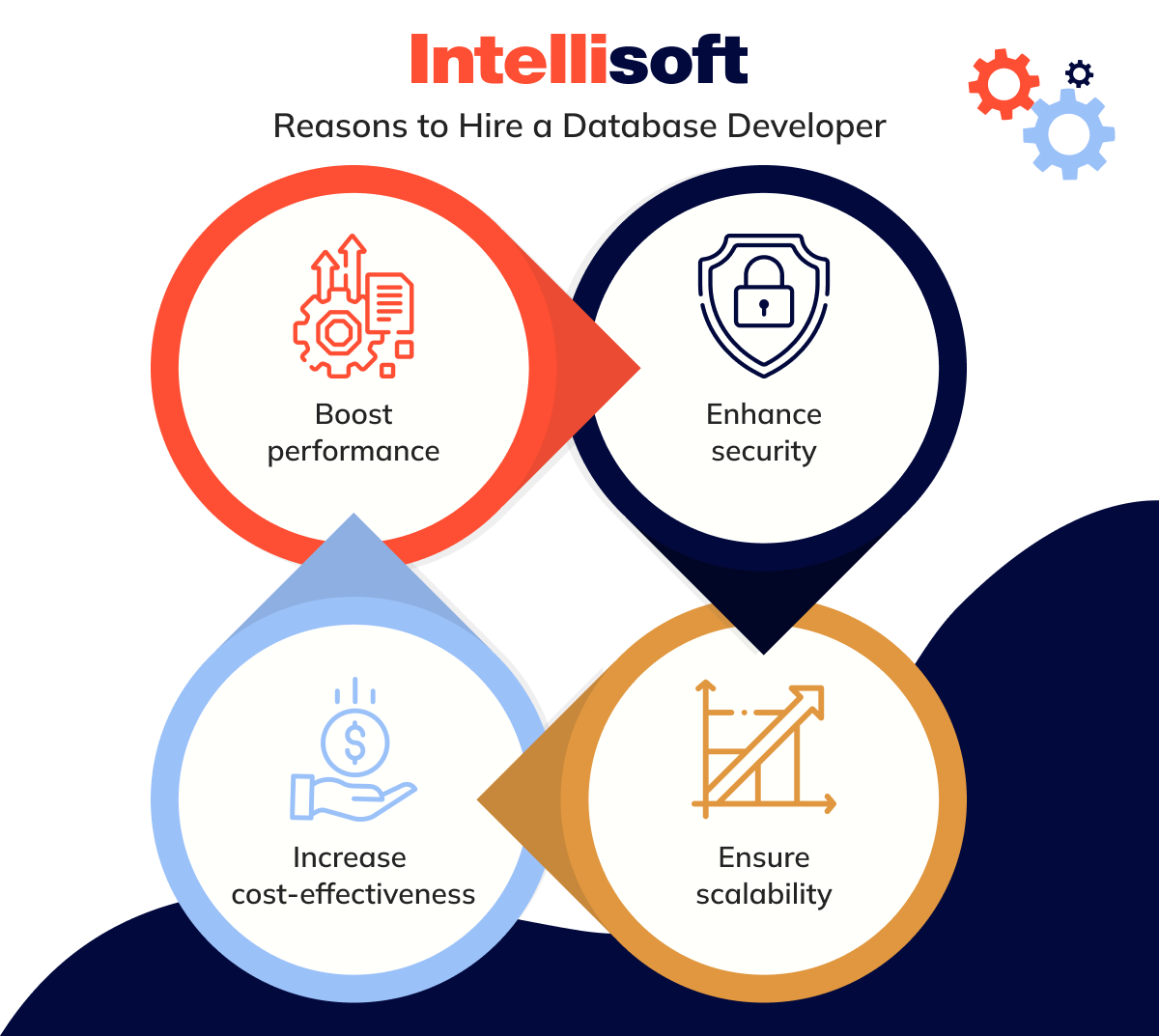
- Boost performance. Database developers are key to supercharging your data systems. They optimize performance, craft secure and up-to-date functions, and even build advanced triggers and stored procedures. This method ensures your data bases run smoothly and efficiently.
- Enhance security. Safeguarding your data is crucial, and that’s where database developers come in. They fortify your systems against breaches with robust access controls and design comprehensive backup and recovery plans. This proactive approach protects your data from malicious threats.
- Ensure scalability. As your company grows, so does your data. Data base developers create adaptable designs that scale seamlessly with your organization. This method means your systems will handle increasing data volumes effortlessly, making future growth a breeze.
- Increase cost-effectiveness. Beyond technical skills, developers streamline your operations. They design solutions that automate routine tasks and reduce manual processes, saving your organization time, money, and resources. Investing in a database developer isn’t just smart—it’s cost-effective.
What Are Database Developer Skills?
When choosing a developer for your team, examining their educational background is essential. This review provides a comprehensive overview of their skills and expertise, ensuring they align perfectly with the demands of your project.
Education Background
Database development is an ever-evolving field that demands a robust educational background and a dedication to ongoing learning. Many data base developers begin their careers with a Bachelor’s degree in computer science, software engineering, or a related discipline. The degree requirement can fluctuate depending on the level of the job you are aiming for.
For entry-level roles, a Bachelor’s degree is generally sufficient. However, if you’re seeking candidates with more advanced knowledge and expertise, consider those holding a Master’s degree in areas like computer science, software engineering, or business intelligence.
Beyond academic qualifications, professional certifications are crucial for keeping developers at the industry’s cutting edge. These certifications ensure that developers stay current with the latest technologies and best practices in database management. Some key database developer certification options to look for include:
- Microsoft Certified: Azure Data Fundamentals
- Microsoft Certified: Azure for SAP Workloads Specialty
- Oracle Certified Professional, Java SE 8 Programmer
- MongoDB Certified Developer Associate
- AWS Certified Database – Specialty Certification
Database Developer Skills
Excelling in database development requires more than just a solid educational background; professionals need to blend technical expertise with essential soft skills.
As for database developer technical skills, they should aim to master a range of key competencies:
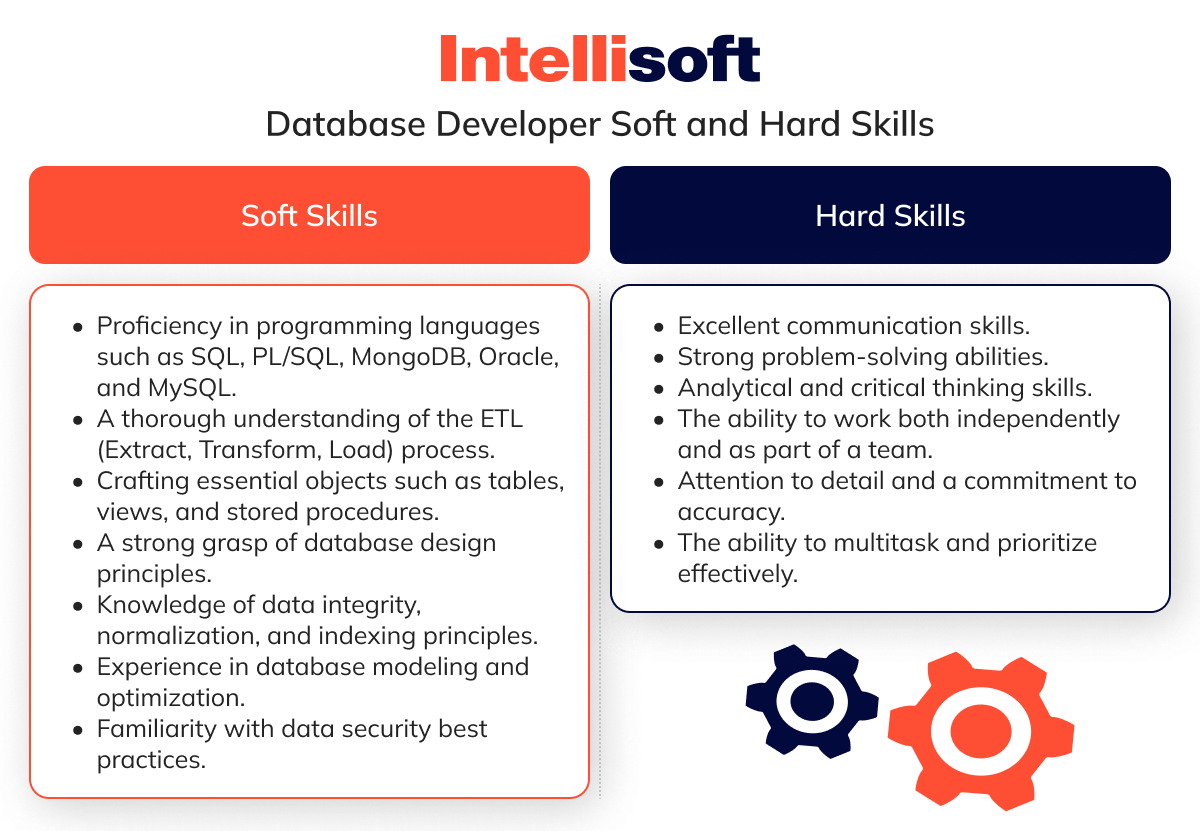
- Proficiency in programming languages such as SQL, PL/SQL, MongoDB, Oracle, and MySQL.
- A thorough understanding of the ETL (Extract, Transform, Load) process.
- Crafting essential objects such as tables, views, and stored procedures.
- A strong grasp of database design principles.
- Knowledge of data integrity, normalization, and indexing principles.
- Experience in database modeling and optimization.
- Familiarity with data security best practices.
On the softer side, database developers should develop:
- Excellent communication skills
- Strong problem-solving abilities
- Analytical and critical thinking skills
- The ability to work both independently and as part of a team
- Attention to detail and a commitment to accuracy
- The ability to multitask and prioritize effectively
“In order to become a great database developer, one must first understand the characteristics of building great databases (including code).” — Mark DeRosa
Key Database Developer Interview Questions
When interviewing for a database developer, it’s essential to assess the candidate’s technical prowess, problem-solving skills, and practical experience with database systems. Here are some crucial database interview questions for Java developer that offer valuable insights:
Tell me about your database development experience. Which systems are you most familiar with?
This question allows candidates to share their professional journey and highlight the technologies they’ve mastered.
Can you explain what normalization is and why it’s important?
Understanding normalization is fundamental for designing efficient databases, making this a vital topic for any developer.
What is the difference between an Inner Join and an Outer Join?
This question tests the candidate’s SQL knowledge and their ability to effectively manipulate and query data.
Could you discuss the different types of database indexes and their purposes? When would you use them?
Indexes are crucial for data base performance optimization. This question assesses the candidate’s knowledge of when and how to utilize them.
How do you optimize SQL queries for better performance?
Efficient query optimization is key to maintaining smooth operations, so this question delves into the candidate’s optimization techniques.
Describe a challenging database project you’ve tackled and how you managed it.
This question helps gauge the candidate’s problem-solving abilities and their approach to handling complex projects.
What security measures do you implement to safeguard sensitive data?
Protecting sensitive information is critical in today’s digital landscape, making it important to understand a candidate’s data security strategies.
Related articles:
- Software Architect vs Software Engineer: Core Differences
- How to Hire Dedicated Developers and Revolutionize Your Workflow
- Data Engineer Roles and Responsibilities: A Brief Explainer
- How to Hire a Software Developer: Tips and Tricks
- IT Talent Sourcing in Ukraine: Best Hiring Strategies
What Is Database Developer Salary?
Curious about how much a database developer makes? Well, it varies based on experience, location, and technical skills. In 2024, across the U.S., here’s what the numbers show:
- On average, database developers rake in about $123,130 annually.
- Glassdoor lists a slightly lower figure, at $116,876 a year. Breaking it down to hourly rates, the average sits around $55 per hour, translating to roughly $114,400 annually if you’re working full-time.
- PayScale, however, offers a more conservative estimate, with an average annual salary of $84,692.
- Database developer salaries can range widely, from $69,000 on the lower end (10th percentile) up to $118,000 (90th percentile).
- If you specialize as an SQL Database Developer, you can expect to earn around $54.72 per hour on average.
Database developer salary: hourly rates by country
The earnings of a database developer can differ dramatically depending on where they work. Let’s take a look at how much these specialists make per hour across various countries:
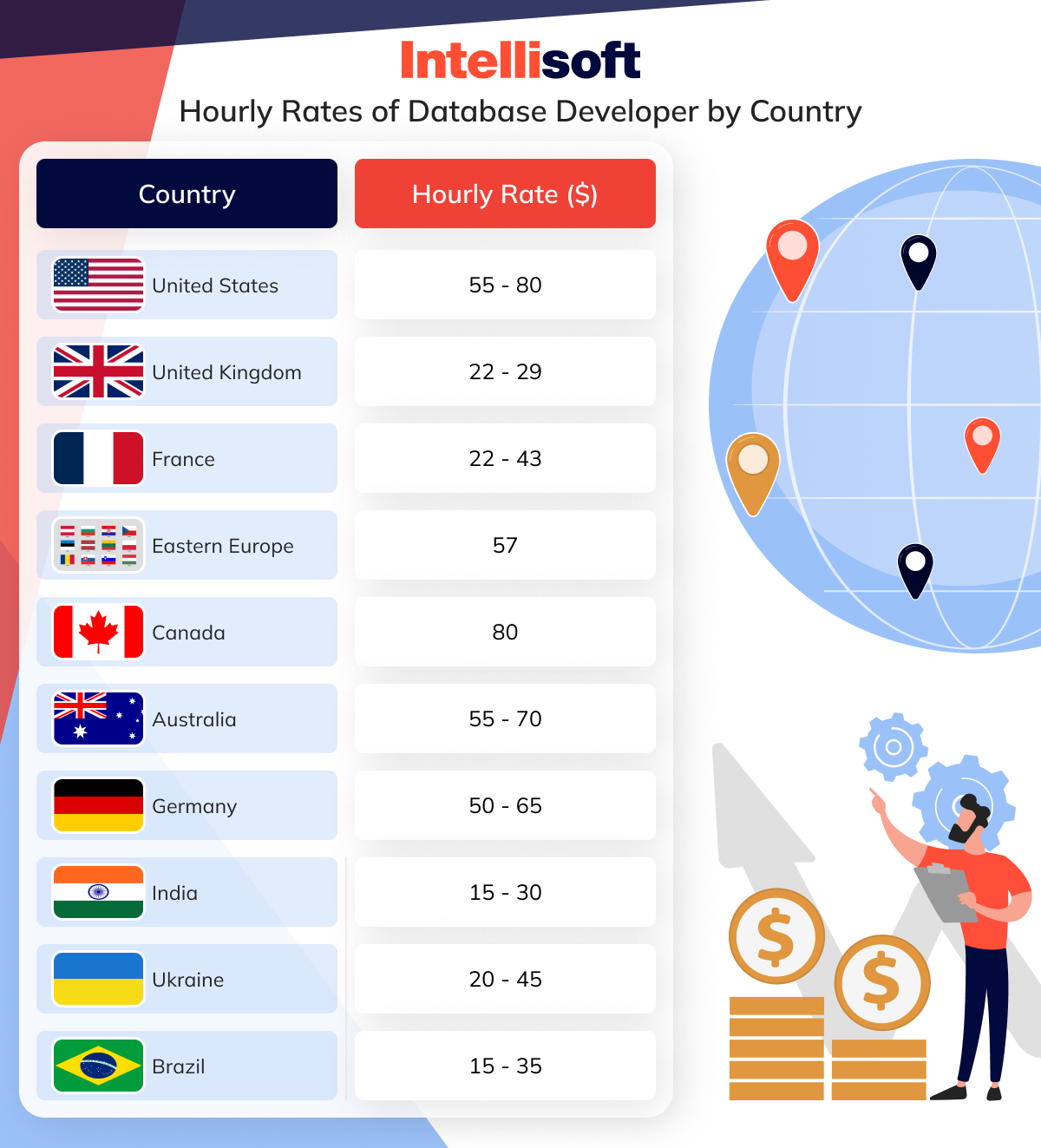
These rates reflect the average hourly pay for data base developers and can vary based on experience, skill level, and specific job requirements.
Database Application Developer Salary
The salary landscape for these tech professionals in 2024 is influenced by various factors including experience, geographical location, and specific job duties. Here’s a quick breakdown of what to expect:
- The average rate for a Database Application Developer in the U.S. is approximately $53.12 per hour.
- Generally, these developers see an average annual salary of about $110,489, with total compensation reaching up to $141,150.
- The lowest 10% earn around $74,000, whereas the senior database developer salary is $125,000.
- Meanwhile, some sources report an average salary closer to $123,130, and others suggest around $84,692.
Oracle Database Developer Salary
What does it pay to specialize in Oracle databases? In 2024, Oracle Database Developers also have a promising financial outlook, with earnings reflecting their specialized skills:
These specialists earn about $54 per hour, with average yearly earnings around $95,144, summing up to a total of $108,466.
An Oracle Developer’s salary can range from $99,952 to $125,256, with the average hitting about $113,210. In some regions, this rate can go as high as $62 per hour.
Junior Database Developer Salary
Are you curious about what a Junior Database Developer makes in the United States this year? The figures are in, and they’re quite intriguing! In 2024, the pay scale for a Junior Database Developer can vary widely based on several factors like where you live and your experience level:
- A Junior Database Developer typically earns about $104,912 annually.
- On an hourly basis, these tech professionals make an average of $32.06, which translates to an annual income of roughly $66,690.
- The range in salaries is quite broad, from as low as $8,949 to as high as $75,929. The average in this range is about $17,534.
Entry Level Database Developer Salary
If you’re considering a career as a developer database, you’ll be pleased to know that entry-level positions in the United States offer competitive salaries. In 2024, here’s what you can expect:
- On average, entry level database developer earns about $55 per hour
- As a Junior Database Developer, the annual salary averages around $66,690
- Similarly, entry-level SQL Developers can also expect to earn $55 per hour
Where to Find a Database Developer?
Finding the right database developer can feel like searching for hidden treasure, but it doesn’t have to be a daunting task. You can take several effective routes to find database developers as the perfect fit for your project.
First, consider freelance platforms such as Upwork, Freelancer, and Fiverr to find a freelance database developer. These sites are bustling with talented professionals offering flexible and cost-effective solutions. It’s a practical way to handle your data base needs without overspending.
For a more personalized approach, LinkedIn communities are incredibly valuable. You can explore the professional journeys of experienced developers, review their portfolios, and join groups focused on database development. It’s an excellent way to network and hire database developers that align with your project’s specific requirements.
If you prefer a more comprehensive solution, outsourcing agencies such as IntelliSoft are worth considering. Known for their strategic partnerships, IntelliSoft connects clients with top-notch IT talent. With a history of serving over 150 companies across the USA and Europe since 2007, they provide reliable and expert services, ensuring your database development is managed by skilled professionals.
In-House vs. Outsourced Database Developers
Deciding whether to hire in-house database developers or to outsource is a crucial choice. Each option has its distinct advantages and challenges.
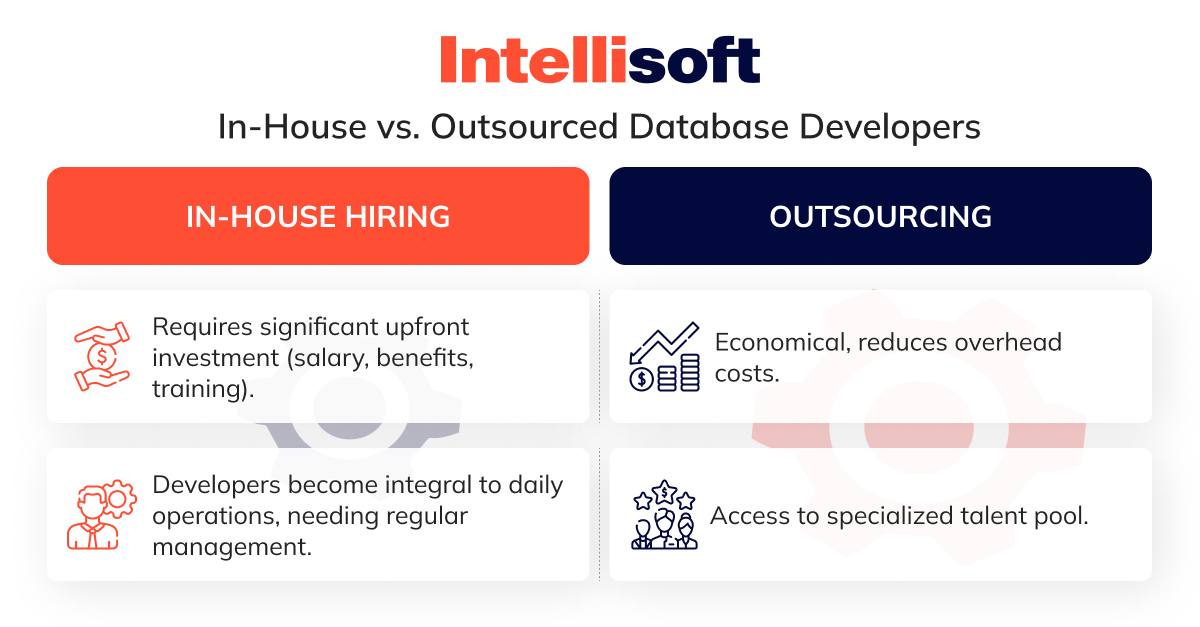
Hiring in-house developers requires a significant upfront investment. These professionals will need not only a full-time database developer salary but also benefits and continuous training. They will become integral to your daily operations, demanding regular management and supervision. On the other hand, outsourcing your data base development can be a more economical solution. This approach gives you access to a remote database developer while reducing the overhead costs associated with full-time staff.
When making your decision, consider important factors such as your budget, your organization’s specific needs, the technologies you use, and the expertise of the developers available. Choosing the right option will ensure your database operations are both efficient and cost-effective.
Hire a Database Developer with IntelliSoft
Database developers are crucial to the success of any business. When expanding your team, it’s essential to access database developers who not only possesses technical expertise but also holds strong educational credentials and interpersonal skills. This is where IntelliSoft excels. As a premier software outsourcing firm, IntelliSoft specializes in matching businesses with exceptional developers. Each candidate is thoroughly vetted to ensure they have the necessary skills, database developer certifications, and the capability to address your specific database needs.
Ready to enhance your team? Contact IntelliSoft today and find the outstanding database developers your business requires to thrive.


